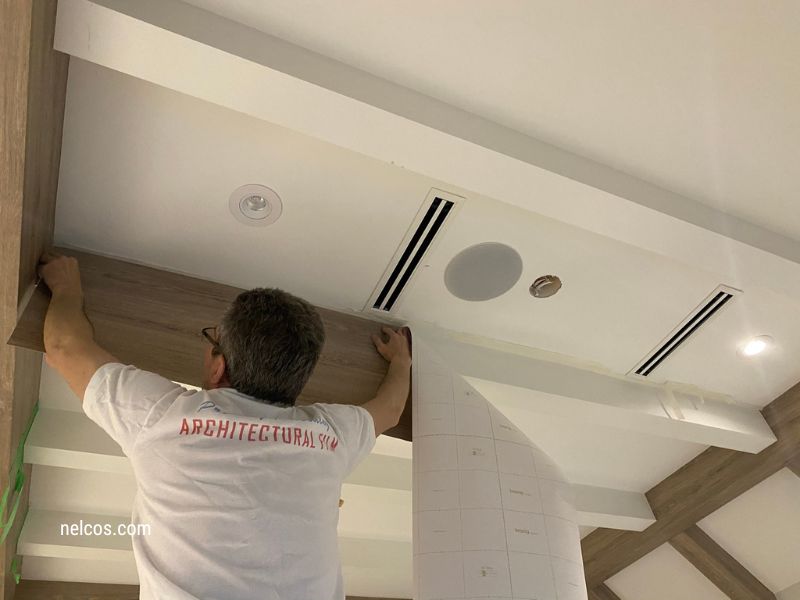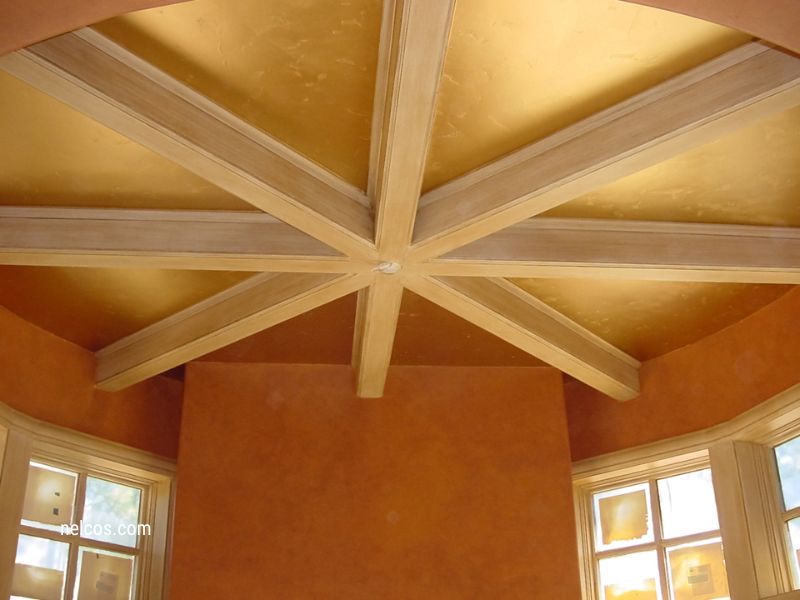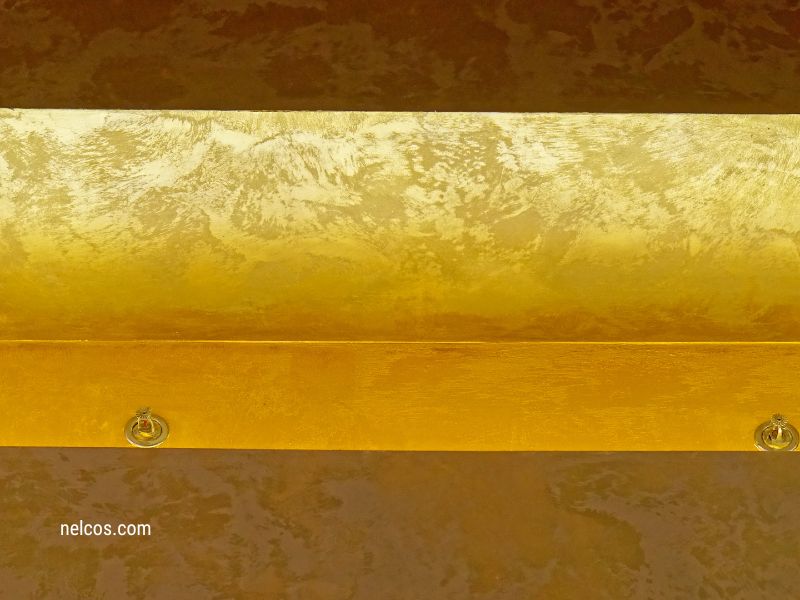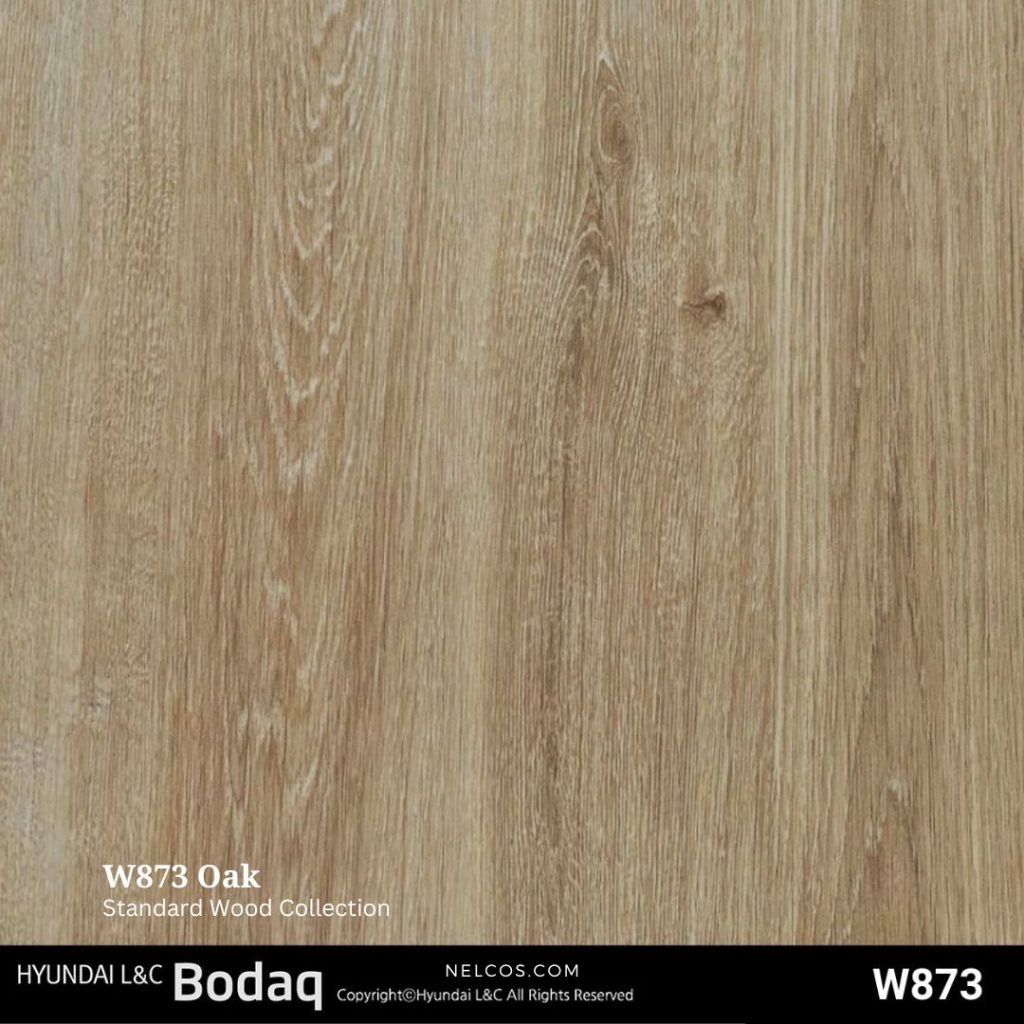Elevate Your Living Room with Architectural Film: Faux Wood Beams
Faux wood beams are a fantastic way to add charm and character to any room without the hassle and expense of real wood. Whether you’re looking to enhance your living room, bedroom, or kitchen, these beams offer a versatile and stylish solution that fits any design aesthetic.
Why Choose Faux Wood Beams?
Faux wood beams provide several benefits over traditional wood beams. They are lightweight, easy to install, and more affordable, making them an excellent choice for both DIY enthusiasts and professional designers. Additionally, faux wood beams are highly durable and require minimal maintenance, ensuring they look great for years to come.
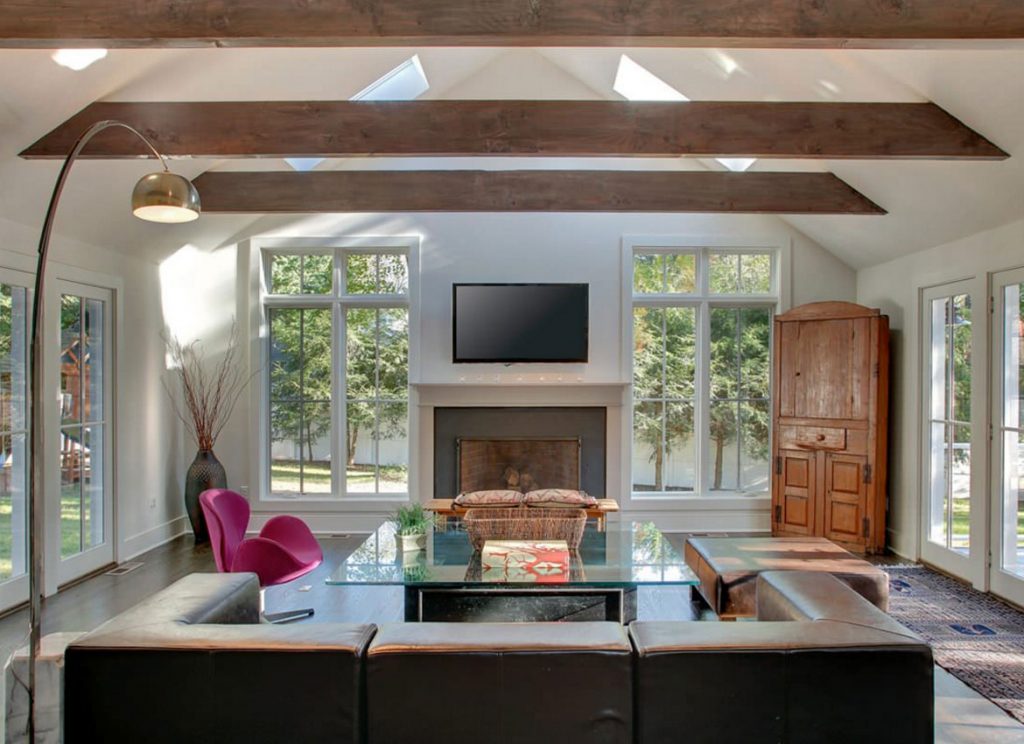
How Architectural Film Can Help Elevate a Living Room
Exposed ceiling beams can either be an architectural feature that supports higher ceilings or a decorative interior design solution that adds coziness to a room. Traditionally, reclaimed or salvaged wood has been used for such purposes. However, designers today often avoid this option due to the heavy weight and susceptibility to insects and moisture. While replacing supporting beams requires architectural consultation, faux wood beams offer a perfect decorative solution.
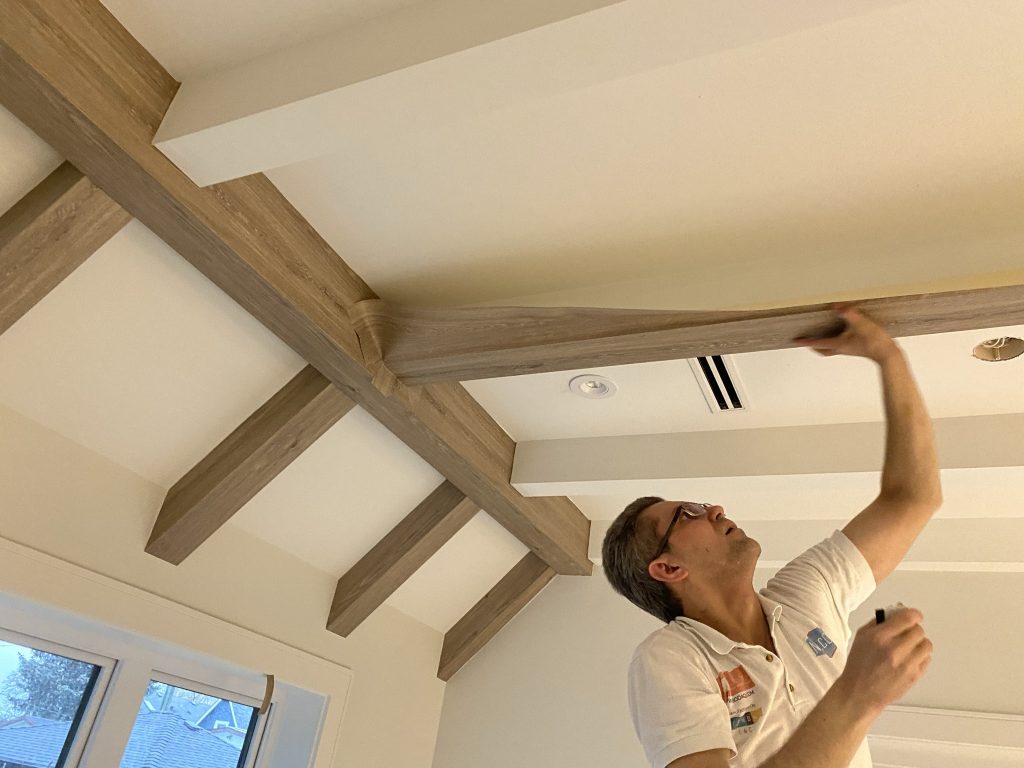
Make it or Fake it. What's the Difference?
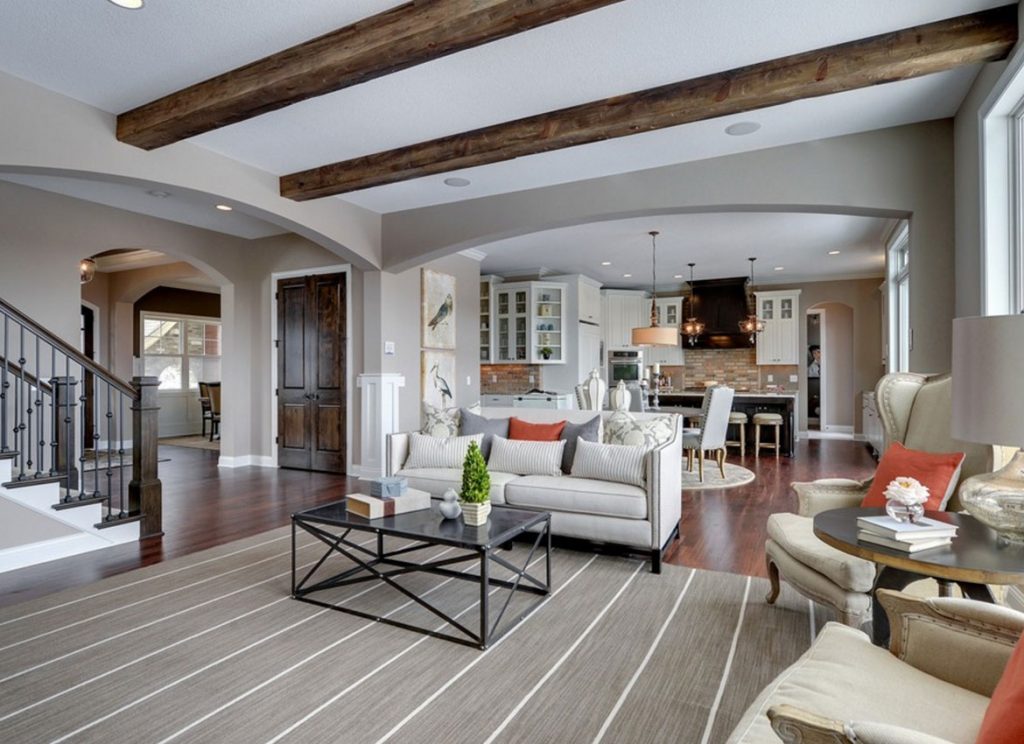
FAUX BEAMS MADE OF POLYURETHANE
Faux wood beams, made from polyurethane, are available in various colors and wood textures at many stores, from Home Depot to Lowe’s. They are lightweight and an excellent substitute for salvaged wood. However, the cost of a typical 8-foot faux wood beam ranges from $170 to $200, excluding installation. This might seem reasonable for accentuating your ceiling with one beam, but what if you need five or more?
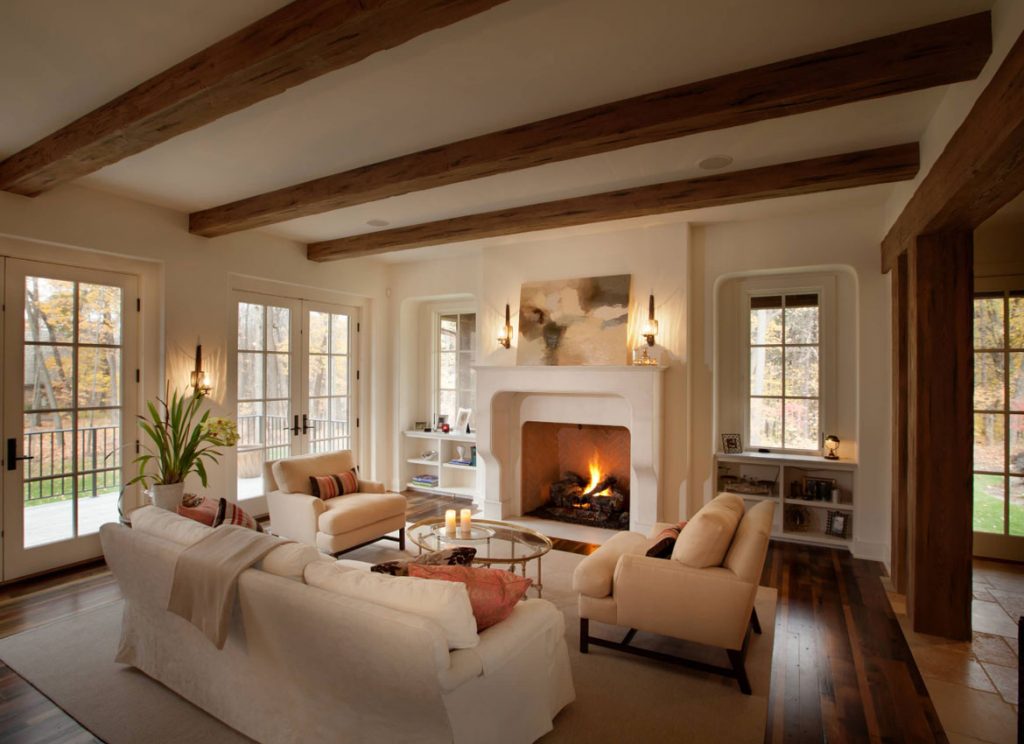
FAUX BEAMS WRAPPED WITH INTERIOR FILM
Architectural vinyl film enables DIY enthusiasts and homeowners to cover two beams for just $20 to $30, depending on the pattern. The only limitation is that vinyl is a refinishing material and must be applied to a prepared surface.
However, this can be advantageous:
Solution for Any Surface
Architectural film can turn any interior ledge into faux beams. For example, drywall can be easily transformed into oak wood beams, as shown in the pictures below.
Space for DIY Design
Whether you want to wrap your beams with clay and cover them with faux wood or create custom-sized and shaped beams, vinyl film applies to any solid surface, allowing for a variety of creative solutions.
Texture Variety
While most ceiling beams are made with wood, architectural film offers the flexibility to create beams with unique textures like onyx or matte black, perfectly matching your interior design.
Faux Wood Beams Design Ideas
Explore some design ideas for incorporating faux wood beams into your living room:
Textured Beams
Experiment with various textures to find the perfect match for your interior.
Faux Wood Beams: Much More to Explore
Architectural film offers numerous advantages over traditional renovation methods, including durability and damage resistance. If you have a project in mind or want to learn more about vinyl characteristics and possible ceiling beam solutions, don’t hesitate to contact us. We love showing people that renovation can be easy, entertaining, and tailored to your taste.
Transforming Faux Wood Beams: A Project Spotlight
In one of our recent projects, a home building company initially designed an all-white ceiling with faux beams that blended into the background, making them almost invisible. The new homeowner wanted the beams to stand out as the focal point of the room, but removing the existing faux beams was not an option, and adding new wood beams would have added too much weight to the structure.
That’s where we stepped in. Using our architectural film with a wood pattern, we transformed the beams effortlessly, giving them the standout appearance the homeowner desired without compromising the integrity of the structure. This solution not only enhanced the room’s aesthetic appeal but also demonstrated the versatility and effectiveness of our interior films.
For This Project We Used W873 Oak Architectural Film – Standard Wood Collection
To achieve the striking transformation, we used W873 Oak Architectural Film from our Standard Wood Collection. This film provided the perfect blend of warmth and elegance, enhancing the faux beams and making them a standout feature in the room. The rich oak pattern brought depth and character, creating a stunning focal point that the homeowners love.
Here’s a Photo Gallery of the Finished Project
Take a look at the stunning transformation we achieved with our architectural film! The once indistinguishable faux beams now stand out beautifully, adding warmth and character to the room. Our wood-patterned film provided the perfect solution, creating a focal point that blends seamlessly with the rest of the decor. Scroll through the gallery to see the before and after shots and get inspired for your next home improvement project.
This project is a prime example of how architectural film can transform your living space with minimal hassle and maximum impact. By choosing our wood-patterned film, the homeowner was able to achieve the desired focal point without the need for heavy, cumbersome wood beams. The result is a visually stunning and structurally sound enhancement that breathes new life into the room. Whether you’re looking to make a bold statement or subtly upgrade your interiors, architectural film offers a versatile, durable, and cost-effective solution. Contact us today to learn how we can help you achieve your design dreams!
FAQ: Faux Wood Beams
1. How to faux wood beams?
Faux wood beams can be created using materials like polyurethane or drywall, which can then be covered with architectural film to achieve a realistic wood appearance. The process involves measuring and cutting the beams to the desired size, preparing the surface, and then applying the architectural film to give it a natural wood look.
2. Are faux beams cheaper than wood?
Yes, faux beams are generally more cost-effective than real wood beams. Real wood beams are not only more expensive to purchase but also require more complex installation and structural support, which adds to the overall cost. Faux beams, especially when covered with architectural film, offer a budget-friendly alternative without compromising on aesthetics.
3. What are fake beams called?
Fake beams are commonly referred to as faux beams or faux wood beams. These beams are designed to mimic the appearance of real wood while being lighter and easier to install.
4. How to attach faux wood beams to a ceiling?
Attaching faux wood beams to a ceiling typically involves securing mounting brackets to the ceiling, onto which the beams can be attached. The beams are then slid over the brackets and fastened securely. This method ensures that the beams are stable and look like they are part of the original structure. Architectural film can then be applied to complete the look.
5. Do faux beams add value?
Yes, faux beams can add value to a home by enhancing its aesthetic appeal. They create a visually striking focal point and can make a room feel more cozy and inviting. This added character and charm can be attractive to potential buyers, thereby increasing the market value of the property.
EXPLORE!

Simple Countertop Refinishing with Nelcos

HD Expo + Conference: Nelcos Brings Interior Film Wrap to Las Vegas

Apartment Renovation with Nelcos Architectural Film

Heavy-Duty Collection: Interior Film for More Kinds of Surfaces

Affordable Home Upgrades with Interior Films




